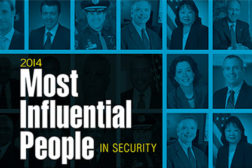- NEWS
- MANAGEMENT
- PHYSICAL
- CYBER
- BLOG
- COLUMNS
- EXCLUSIVES
- SECTORS
- Arenas / Stadiums / Leagues / Entertainment
- Banking/Finance/Insurance
- Construction, Real Estate, Property Management
- Education: K-12
- Education: University
- Government: Federal, State and Local
- Hospitality & Casinos
- Hospitals & Medical Centers
- Infrastructure:Electric,Gas & Water
- Ports: Sea, Land, & Air
- Retail/Restaurants/Convenience
- Transportation/Logistics/Supply Chain/Distribution/ Warehousing
- EVENTS
- MEDIA
- MORE
- EMAG
- SIGN UP!
Security Leadership and Management
The Most Influential People in Security 2014
Each year, Security magazine honors top security executives who positively impact the security industry, their organization, their colleagues and their peers.
September 1, 2014
How to Adjust Security for Hazardous Locations
Many enterprises are looking beyond the U.S. shores to expand into emerging markets.
September 1, 2014
Register Now for the Security 500 Conference at OSAC
The 2014 Security 500 Conference has an unprecedented “don’t miss” program planned for attendees.
September 1, 2014
Measuring U.S. Security Perceptions
ACCORDING TO THE 2014 Unisys Security Index, the top three individual concerns in the U.S. are identity theft, bankcard fraud and national security in relation to war or terrorism.
September 1, 2014
Who is Facilitating Insider Threats?
Are enterprises in an impossible situation when it comes to dealing with insider threats?
September 1, 2014
Managing Security for a Growing Corporate Campus
The Cox Enterprises campus went from having one employee entrance to three, in addition to a visitor entrance.
September 1, 2014
How Atlanta Increased Security by Sharing Surveillance
Atlanta’s Operation Shield Video Integration Center (VIC) started with a mere 17 city-funded cameras three years ago.
September 1, 2014
Sign-up to receive top management & result-driven techniques in the industry.
Join over 20,000+ industry leaders who receive our premium content.
SIGN UP TODAY!Copyright ©2025. All Rights Reserved BNP Media.
Design, CMS, Hosting & Web Development :: ePublishing









